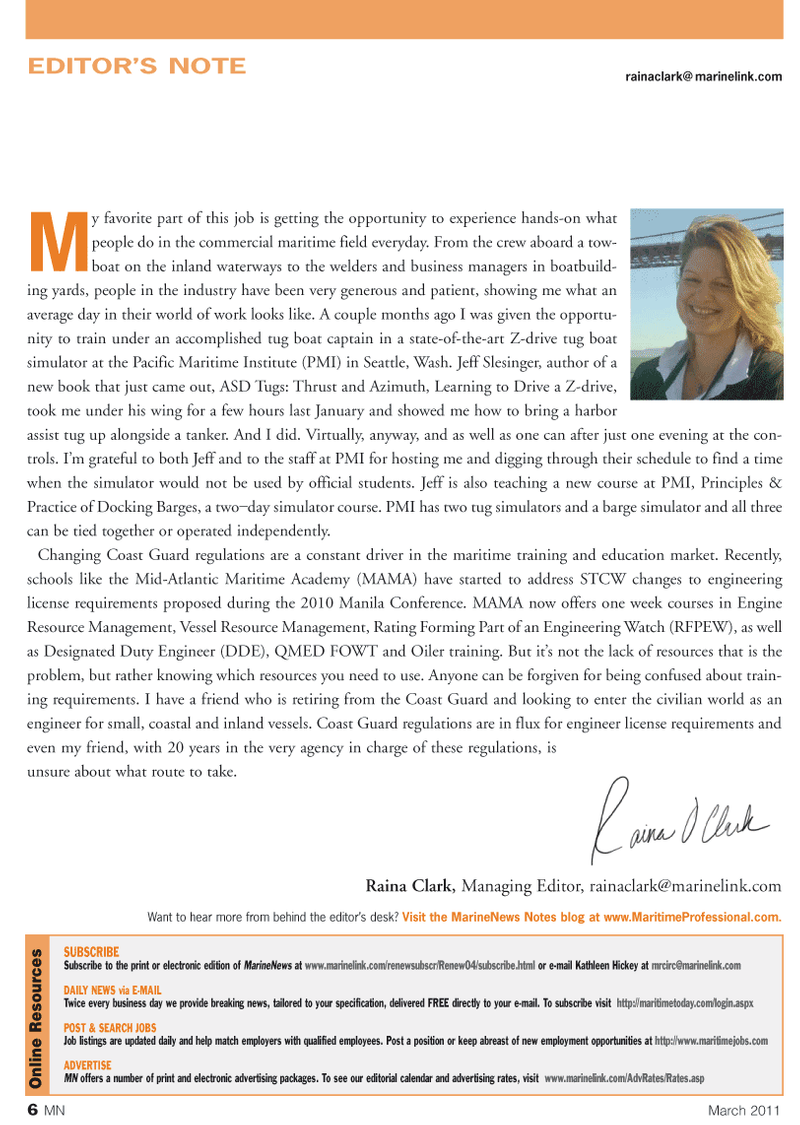
Page 6: of Marine News Magazine (March 2011)
Marine Training & Education Edition
Read this page in Pdf, Flash or Html5 edition of March 2011 Marine News Magazine
M y favorite part of this job is getting the opportunity to experience hands-on what people do in the commercial maritime field everyday. From the crew aboard a tow- boat on the inland waterways to the welders and business managers in boatbuild- ing yards, people in the industry have been very generous and patient, showing me what an average day in their world of work looks like. A couple months ago I was given the opportu- nity to train under an accomplished tug boat captain in a state-of-the-art Z-drive tug boat simulator at the Pacific Maritime Institute (PMI) in Seattle, Wash. Jeff Slesinger, author of a new book that just came out, ASD Tugs: Thrust and Azimuth, Learning to Drive a Z-drive, took me under his wing for a few hours last January and showed me how to bring a harbor assist tug up alongside a tanker. And I did. Virtually, anyway, and as well as one can after just one evening at the con- trols. I’m grateful to both Jeff and to the staff at PMI for hosting me and digging through their schedule to find a time when the simulator would not be used by official students. Jeff is also teaching a new course at PMI, Principles &
Practice of Docking Barges, a two�aday simulator course. PMI has two tug simulators and a barge simulator and all three can be tied together or operated independently.
Changing Coast Guard regulations are a constant driver in the maritime training and education market. Recently, schools like the Mid-Atlantic Maritime Academy (MAMA) have started to address STCW changes to engineering license requirements proposed during the 2010 Manila Conference. MAMA now offers one week courses in Engine
Resource Management, Vessel Resource Management, Rating Forming Part of an Engineering Watch (RFPEW), as well as Designated Duty Engineer (DDE), QMED FOWT and Oiler training. But it’s not the lack of resources that is the problem, but rather knowing which resources you need to use. Anyone can be forgiven for being confused about train- ing requirements. I have a friend who is retiring from the Coast Guard and looking to enter the civilian world as an engineer for small, coastal and inland vessels. Coast Guard regulations are in flux for engineer license requirements and even my friend, with 20 years in the very agency in charge of these regulations, is unsure about what route to take.
SUBSCRIBE
Subscribe to the print or electronic edition of MarineNews at www.marinelink.com/renewsubscr/Renew04/subscribe.html or e-mail Kathleen Hickey at [email protected]
DAILY NEWS via E-MAIL
Twice every business day we provide breaking news, tailored to your specification, delivered FREE directly to your e-mail. To subscribe visit http://maritimetoday.com/login.aspx
POST & SEARCH JOBS
Job listings are updated daily and help match employers with qualified employees. Post a position or keep abreast of new employment opportunities at http://www.maritimejobs.com
ADVERTISE
MN offers a number of print and electronic advertising packages. To see our editorial calendar and advertising rates, visit www.marinelink.com/AdvRates/Rates.asp
Raina Clark, Managing Editor, [email protected]
Want to hear more from behind the editor’s desk? Visit the MarineNews Notes blog at www.MaritimeProfessional.com.
Online Resour ces 6 MN March 2011
EDITOR’S NOTE rainaclark@ marinelink.com

 5
5

 7
7
